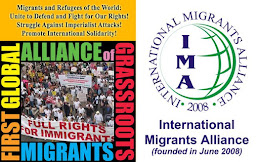Migrante International marches today with the working people of the world in the fight against imperialist plunder and war that continue to threaten the lives and welfare of peoples, migrants and migrant workers, particularly overseas Filipinos and their families.
Today, Migrante International unites with other sectors of Philippine society to condemn the Aquino administration’s puppetry and policy of subservience to foreign dictates that perpetuate the present worsening socio-economic crisis in the Philippines.
Under Aquino, OFWs and their families have suffered and continue to suffer. Thousands upon thousands of urban poor families have been displaced through violent demolition of their homes. Farmers and farm workers have been driven off their lands by landlords, hacienderos and corporate land-grabbers. The environment is being plundered by big foreign corporations. Oil prices and costs of other basic commodities continue to surge while wages are fixed at lowest levels and unemployment is record-high – all in the name of neoliberal policies being pushed by Aquino’s imperialist masters.
Aquino’s puppetry goes beyond economic plunder. The Visiting Forces Agreement, the expanded Balikatan exercises and the Aquino government’s all-out support to imperialist war-mongering are testament to Aquino’s adherence to a one-sided foreign policy at the expense of national security and sovereignty. Furthermore, in accordance with the US Counter-Insurgency Strategy (US COIN), the Aquino administration and the Armed Forced of the Philippines (AFP) enforce the Oplan Bayanihan which, like Gloria Arroyo’s Oplan Banty-Laya, aims to quell dissent and suppress civil liberties.
For the migrant sector, conditions have gone from bad to worse. The Aquino government has failed over and over again to protect and uphold the rights of OFWs, especially those in distress and those displaced by wars and the global economic crisis.
The Aquino administration’s continuous intensification of a labor export policy despite escalating violence and conflicts in the Middle East, North Africa and other regions and the worsening global economic crisis has aggravated forced migration, driving Filipino workers to leave their families and homeland at great risks and difficulties abroad.
Nothing short of the reversal of the present system will put an end to forced migration, poverty and social injustice. Past and present experiences have revealed the bankruptcy of the labor export policy, of the present economic system. For as long as there is landlessness, no domestic jobs are available, and prices continue to soar sky-high, OFWs will be forced to seek employment abroad despite the ongoing global economic crisis that continues to displace thousands of OFWs or place them in imminent danger or war.
On Labor Day 2012, Migrante International salutes all workers and migrant workers alike for continuing to organize and persisting in the struggle for freedom, national democracy and sovereignty. Workers of the world, unite! ###
Reference: Garry Martinez, Chairperson, +63 939-391-4418
Tuesday, May 1, 2012
Sunday, January 8, 2012
How US Policies Fueled Mexico's Great Migration
David Bacon
This article was reported in partnership with The Investigative Fund at The Nation Institute and the Puffin Foundation. Some names of the people profiled in this article have been changed.
Roberto Ortega tried to make a living slaughtering pigs in Veracruz, Mexico. “In my town, Las Choapas, after I killed a pig, I would cut it up to sell the meat,” he recalls. But in the late 1990s, after the North American Free Trade Agreement (NAFTA) opened up Mexican markets to massive pork imports from US companies like Smithfield Foods, Ortega and other small-scale butchers in Mexico were devastated by the drop in prices. “Whatever I could do to make money, I did,” Ortega explains. “But I could never make enough for us to survive.” In 1999 he came to the United States, where he again slaughtered pigs for a living. This time, though, he did it as a worker in the world’s largest pork slaughterhouse, in Tar Heel, North Carolina.
For complete article : http://www.thenation.com/article/165438/how-us-policies-fueled-mexicos-great-migration
This article was reported in partnership with The Investigative Fund at The Nation Institute and the Puffin Foundation. Some names of the people profiled in this article have been changed.
Roberto Ortega tried to make a living slaughtering pigs in Veracruz, Mexico. “In my town, Las Choapas, after I killed a pig, I would cut it up to sell the meat,” he recalls. But in the late 1990s, after the North American Free Trade Agreement (NAFTA) opened up Mexican markets to massive pork imports from US companies like Smithfield Foods, Ortega and other small-scale butchers in Mexico were devastated by the drop in prices. “Whatever I could do to make money, I did,” Ortega explains. “But I could never make enough for us to survive.” In 1999 he came to the United States, where he again slaughtered pigs for a living. This time, though, he did it as a worker in the world’s largest pork slaughterhouse, in Tar Heel, North Carolina.
For complete article : http://www.thenation.com/article/165438/how-us-policies-fueled-mexicos-great-migration
Subscribe to:
Posts (Atom)
